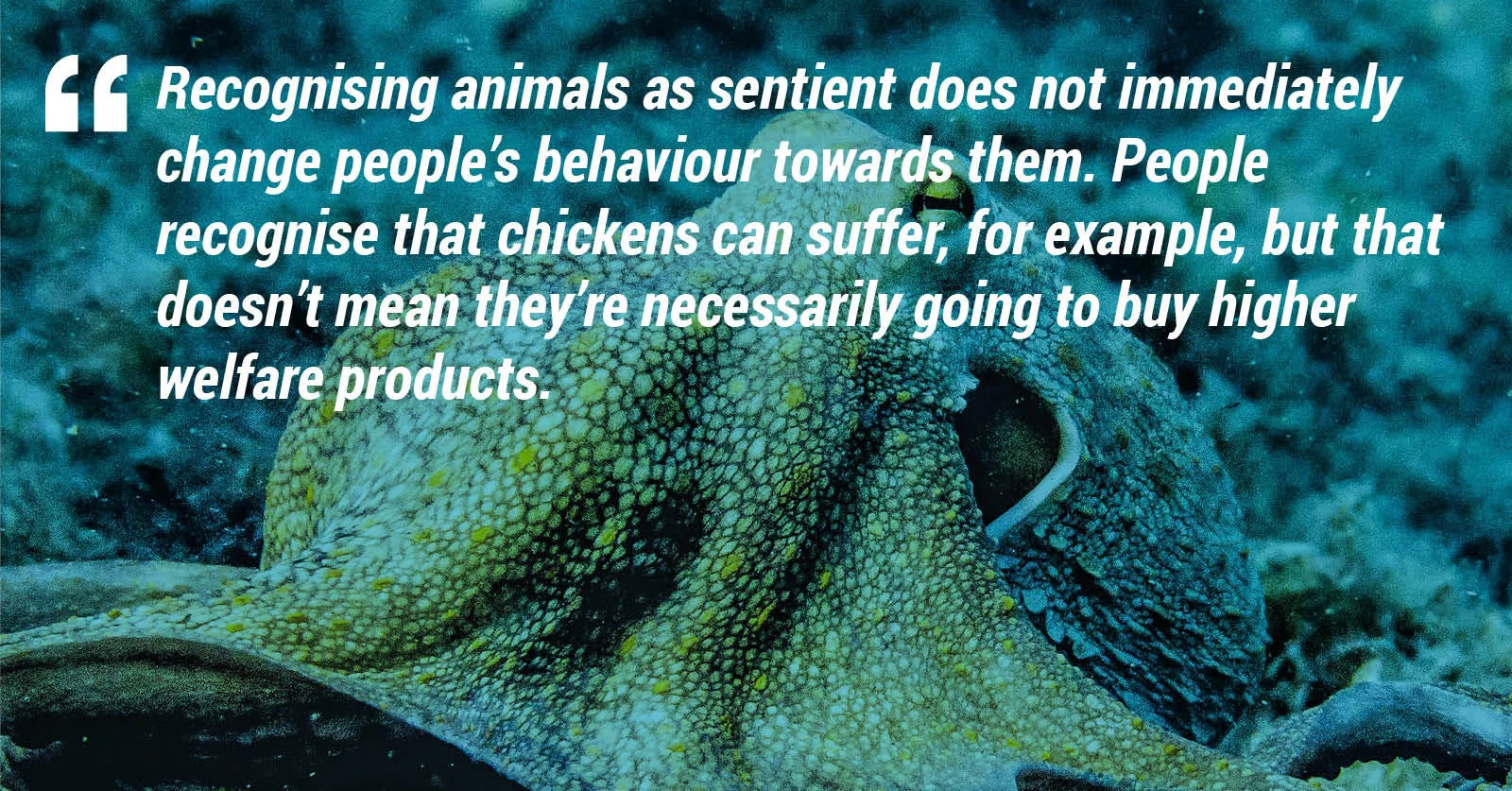Seeing animals differently: the science and ethics of sentience

Contents
In 1822, the UK became the first country to pass an act of animal welfare legislation – The Cruel Treatment of Cattle Act. Known as Martin’s Act, after MP Richard Martin, the act was the world’s first animal anti-cruelty law and marked the beginning of the UK’s global reputation as a nation of animal lovers.
Over 200 years later, Jonathan Birch, Professor in the Department of Philosophy, Logic and Scientific Method at LSE, is advocating for the UK to live up to this reputation and return to a global leadership role in animal welfare. He is shaping this effort through changes in legislation brought about by his groundbreaking 2021 report, Review of the Evidence of Sentience in Cephalopod Molluscs and Decapod Crustaceans, and through his directorship of the newly-opened Jeremy Coller Centre for Animal Sentience at LSE.
Professor Birch’s 2021 report resulted in an extension of the Animal Welfare (Sentience) Bill to include all decapod crustaceans and cephalopod molluscs – the first time decapods (including crabs, lobsters and crayfish) had ever received any protection in UK animal welfare law. A recommendation in the report to ban octopus farming contributed to a ban on the practice in Washington State, and more recently in California.

Understanding the inner lives of octopuses, squid and cuttlefish?
Professor Birch is also editor-in-chief of a new report, commissioned by the Brooks Institute for Animal Rights Law and Policy as part of the Living Bibliography Project on Cephalopod Cognition and Sentience. It acts as a freely available guide to what we currently know about octopuses, squid and cuttlefish, including how we can treat these animals ethically via signposting and summarising the available literature. As part of the project, the report will be periodically updated as new research is completed.
The report explores the inner lives of octopuses, squid, cuttlefish and nautiluses as well as their capabilities, from problem solving and intelligence, learning and memory, sociality and mating strategies to emotion, pain, key welfare needs and more.
As Professor Birch explains: “Cephalopods are extremely interesting because they're separated from us for over 500 million years of evolution. Their nervous systems and their bodies are very differently organised. And yet we do clearly see a form of intelligence there. We see it when octopuses open jars to access food and when they carry around two halves of a coconut shell to use as a portable shelter.
“We see this amazing problem-solving power that has convergently evolved and obviously leads to thought about whether there's a form of sentience there as well, and whether that's evolved by a different route from a common ancestor that was not sentient at all, or whether sentience is something that was there more than 500 million years ago when our line diverged from the octopus line.”
Although the 2021 report was hugely influential, Professor Birch argues that there remains an element of unfinished business: “We called for the rest of the UK animal welfare laws to also be amended to be brought in line with the new Act, which didn’t happen. So there's various pieces of legislation that don't cover invertebrates, particularly humane slaughter regulations, where we need to see some changes in order to ban dropping lobsters into pans of boiling water.
“The 2022 Act puts policymakers under a duty to consider the animal welfare impacts of their actions but it didn't change any of the lower-level legislation around humane slaughter which includes a very general line about not causing unnecessary suffering. What's needed now is guidance that explicitly rules out some slaughter methods as causing unnecessary suffering.”

From evidence to action: launching the Jeremy Coller Centre
These issues and more will be addressed by the creation of the Jeremy Coller Centre for Animal Sentience at LSE, launched at a free public event on 30 September 2025 and headed up by Professor Birch. With a core team encompassing academics from philosophy, veterinary medicine, evolutionary biology, comparative psychology, neuroscience, behavioural science, computer science, artificial intelligence, economics and law, the Centre will focus on encouraging a shift in public understanding of sentience, thinking around animal ethics, and the choices we make as a result of this understanding.
The Centre will also look out for major opportunities to intervene in order to advance animal welfare via improved policymaking. With an eye to the future, Professor Birch also intends the Centre to play a leading role in exploring how animals are represented in and affected by AI, ensuring ethical considerations are built into the technologies of the future.
“Everything we're doing is going to be strongly impact-driven, because we want to produce positive change that improves the lives of animals,” explains Professor Birch. “We hope to see all of the changes we recommended in 2021 to return consistency to animal welfare law, but we're also opening up new areas of inquiry.
“We want to study human attitudes towards animals, because it's often remarked that recognising animals as sentient does not immediately change people's behaviour towards them. People recognise that chickens can suffer, for example, but that doesn't mean they're necessarily going to buy higher welfare products. There's lots that can be done to remedy that, including work around animal welfare labelling that we hope to see in the near future.”
Welfare at scale: the promise and risks of AI in farming
Artificial intelligence is already beginning to transform how we think about animal welfare, particularly in industrial farming, and the Jeremy Coller Centre will focus on debates around what responsible AI looks like in different sectors.
One example given by Professor Birch is the Norwegian salmon farming industry, which has enthusiastically adopted the use of machine learning in order to identify and eliminate infestations of lice on salmon in the very early stages, preventing widespread outbreaks. Similarly, in poultry farming, flocks of chickens can be monitored using AI to detect the early signs of bird flu outbreaks and other diseases.
There are opportunities for new technologies to offer real welfare improvements at scale, but as Professor Birch explains: “We have to make sure that welfare improvements don’t come at a terrible cost. If we have good regulation ensuring responsible AI use, there could be a very positive outcome for animals.”
Looking ahead, the Jeremy Coller Centre is setting its sights on multiple ethical moonshots in order to push the boundaries of how society thinks about and interacts with animals. In addition to recommending substantial regulation on the use of AI in farming in order to harness the benefits of AI while avoiding the costs, the Centre is committed to ensuring that invertebrate animals are meaningfully included in policy. The ultimate goal is to see animal welfare impact assessments become a routine part of government decision-making.
At the core of this vision, however, is a philosophical project as much as a political or scientific one: “It’s not so much about changing people’s values as about trying to work out a path from where we are now to a society where those values are actually respected at the heart of how we do things ... One of the deepest human needs is to relate in a positive way to the rest of the natural world and to live in a way that is in harmony with other animals and does not cause them to suffer.”
The Jeremy Coller Centre for Animal Sentience was made possible by The Jeremy Coller Foundation.
Professor Jonathan Birch was speaking to Helen Flood, Media Relations Officer at LSE.





